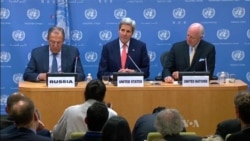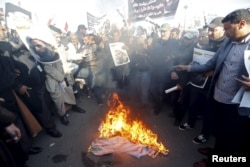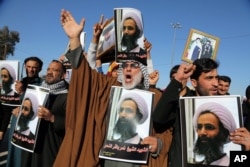The Obama administration had warned Saudi Arabian officials about the potential consequences of executing the Shi'ite cleric whose death has roiled the Mideast and set off worldwide protests, White House spokesman Josh Earnest said Monday.
"There have been direct concerns raised by U.S. officials to Saudi officials about the potential damaging consequences of following through on the execution -- on mass executions, in particular, the execution of" Nimr al-Nimr, Earnest said during a Monday news briefing.
"This is a concern that we raised with the Saudis in advance, and unfortunately, the concerns that we expressed to the Saudis have precipitated the kinds of consequences that we were concerned about," he said.
U.S. State Department spokesman John Kirby echoed the White House comments, saying, "We are particularly concerned that the execution of (al-Nimr) risks exacerbating sectarian tensions at a time when they urgently need to be reduced."
Worldwide reaction
Shi'ite communities have reacted furiously to the execution of al-Nimr, a prominent critic of Saudi Arabia's ruling royal family and who was a key leader of Shi'ite protests in eastern Saudi Arabia in 2011. He was convicted in 2014 of sedition and other charges, and was one of 47 people executed in Saudi Arabia Saturday.
Following the news, protesters set fire to the Saudi embassy in Tehran, and the Sunni kingdom cut diplomatic relations with Iran, its Shi'ite regional rival.
Earnest also expressed concern Monday about the Iranians' failure to protect the Saudi diplomatic facility. At least 40 protesters were arrested in the attacks, which Iranian President Hassan Rouhani called "totally unjustifiable." But he also denounced al-Nimr's execution.
Over the past two days, U.S. Secretary of State John Kerry has spoken with Iran Foreign Minister Mohammad Javad Zarif, and with Saudi Arabia’s deputy crown prince and defense minister, Mohammed bin Salman, and with Foreign Minister Adel al-Jubeir in an attempt to defuse the escalating tensions.
Kerry also planned a round of calls to the foreign ministers of all the Sunni-led states in the Gulf region.
The rift comes at a fragile time in the region and the White House has urged the regional rivals to not let the dispute derail efforts to end Syria's 5-year-old civil war.
"Hopefully, they will continue to engage," Earnest said. "It is so clearly in the interests of both countries to advance a political solution to the situation inside of Syria."
The administration doesn't want to see the latest dispute affect progress made against the Islamic State group in Syria and Iraq, and efforts to end conflicts in Syria and Yemen. But Kirby said, “Ultimately, these are issues that these countries have to work out for themselves. ... So while we continue to make all efforts to facilitate dialogue, the emphasis is on local leadership to work through their differences and find the best path forward through this tension.
"If you’re asking if we’re trying to be a mediator in all this, the answer is no," he added.
Alex Vatenka of the Middle East Institute said the United States cannot do much to resolve the dispute. He told VOA's Deewa Service he believes that "one party will accuse the U.S. of siding if it says anything about the other."
Brother's accusation
Meanwhile, al-Nimr's brother, Mohammad al-Nimr, has accused U.S. President Barack Obama of failing to influence the Saudi government to prevent the cleric's death, according to a Yahoo News report.
“I am sorry to say that the American government did not offer to make any efforts on this, although they knew the danger of this action and the repercussions,” Mohammed Al-Nimr told the online news site. “We asked very clearly for the American president to intervene as a friend of Saudi Arabia -- and the Americans did not intervene."
Mohammed al-Nimr told Yahoo News that he personally asked officials at the U.S. consulate in Dharan, Saudi Arabia, to urge Obama to speak out against his brother’s death sentence. But he said no statement was issued. “They limited themselves to general statements from the State Department."
Earlier this year, two other Shi'ite men involved in the protests were sentenced to death, including Ali al-Nimr, the son of Mohammed al-Nimr, who was 17 years old at the time of the demonstrations.
The sentences have yet to be carried out.
At the time, State Department spokesman Kirby said the U.S. government was “deeply concerned by the case of Ali al-Nimr,” noting that he was then a juvenile and that a confession he made in a Saudi jail was reportedly made “under duress.”
A White House spokesman declined to comment to Yahoo News about Mohammed al-Nimr’s statements, including his criticism of Obama.
However, a senior administration official emailed Yahoo News, saying: “We have spoken to the Saudi government about the cases of Nimr al-Nimr and Ali al-Nimr, as well as other (Shi'ite) protesters who were sentenced to death, and asked the Saudi government to ensure fair trial and appeal guarantees and transparent judicial proceedings in all cases.”
Obama administration officials privately acknowledged, according to the Yahoo report, the Saudi mass executions and other human rights abuses have raised difficult diplomatic issues as the U.S. attempts to push the Saudis to take a more active role in the anti-IS fight.
Some material for this report came from Reuters.












